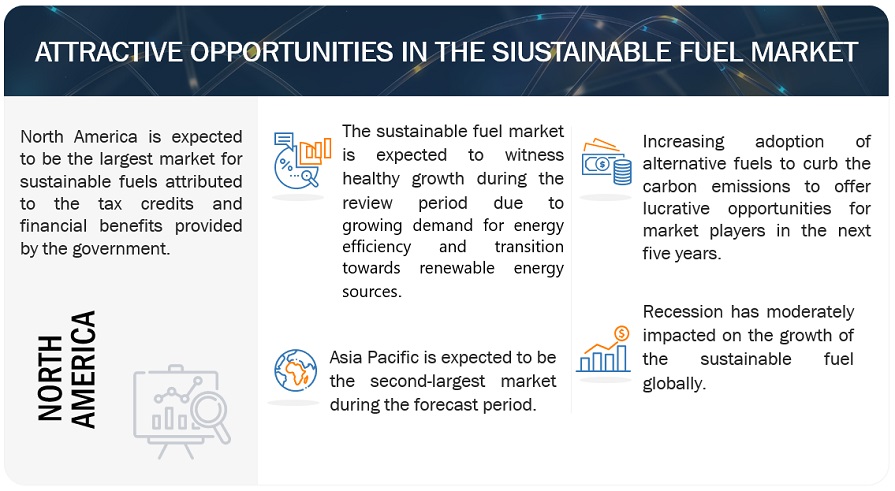According to a new market research report, the sustainable fuel industry is expected to reach USD 299.9 billion by 2029, up from an anticipated USD 193.8 billion in 2024, at a CAGR of 9.1% over the forecast period. Governments throughout the world are enacting stronger environmental restrictions and policies to encourage the use of renewable energy. The fluctuating costs of traditional fossil fuels provide an economic incentive to invest in more stable and predictable sustainable fuel alternatives. Companies are increasingly adopting sustainable fuels as customer knowledge and demand for ecologically friendly products rise. Many businesses are establishing aggressive sustainability goals, such as using renewable fuels to satisfy their environmental obligations are few of the major drivers anticipated to propel the growth of the market.
Browse 287 market data Tables and 83 Figures spread through 341 Pages and in-depth TOC on "Sustainable Fuel Market"
Download PDF Brochure: https://www.marketsandmarkets.com/pdfdownloadNew.asp?id=68114533
This report segments the sustainable fuel market based on the End user- Road transportation, Marine and Aviation. Based on State – Gas and Liquid. Based on type – Low carbon fossil fuels and renewable fuels and based on fuel type – Biofuel, Biomethane, Hydrogen, CNG and e-fuels.

Based on Fuel type, the sustainable fuel market is segmented into five types of fuels: Biofuels, Biomethane, Hydrogen, Compressed Natural Gas (CNG) and e-fuels. Among them, the Biofuels will be the largest segment. Biofuels are viewed as a greener alternative to fossil fuels, as they reduce GHG emissions significantly and contribute to climate change mitigation. This environmental benefit is a major driver of their expansion. Furthermore, biofuels help to reduce dependency on imported fossil fuels, so improving national energy security. Countries may mitigate the risks of oil price volatility and geopolitical crises by diversifying their energy sources. Furthermore, growing prices for traditional jet fuels encourage the aviation industry to look for more cost-effective and sustainable options, driving demand for aviation biofuel.
Key Stakeholders
- Energy Regulators
- Renewable fuel producers
- Low carbon fuel producers
- Consulting companies in the energy and power sector
- Institutional investors/shareholders
- Governments and research organizations
Make an Inquiry: https://www.marketsandmarkets.com/Enquiry_Before_BuyingNew.asp?id=68114533
This report segments the sustainable fuel market based on state into 2 categories: Gas and Liquid. The gas segment is expected to be the fastest-growing segment in the sustainable fuel market. To reduce greenhouse gas emissions, governments throughout the world are implementing stricter environmental restrictions. This legislative drive promotes the use of cleaner alternatives such as biomethane, CNG, and hydrogen, which benefits the gas category in the sustainable fuel market. Furthermore, advances in gas generation, storage, and distribution technologies have considerably enhanced the efficiency and viability of renewable gases such as biomethane and hydrogen. alternative developments cut prices while increasing the usefulness of alternative fuels. Furthermore, sustainable gasses improve energy security by lowering reliance on imported fossil fuels. Diversifying the energy mix with local and renewable gas sources helps to stabilize energy supply and costs, which encourages their use.
Based on End Users, the sustainable fuel market is segmented into 3 categories: Road transportation, Marine, and Aviation. The Road transportation segment is anticipated to grow as the largest segment in the sustainable fuel market. To combat climate change and reduce carbon emissions, nations are enacting strict environmental regulations. This supports the use of cleaner fuels in road transportation, such as biofuels, biomethane, CNG, hydrogen, and e-fuels, to meet emission targets. Furthermore, continual developments in fuel technology, such as improved hydrogen fuel cells and more efficient biofuel manufacturing processes, increase the viability and performance of sustainable fuels in road transportation. These advancements reduce costs and improve fuel efficiency, making them more appealing to both consumers and businesses.
Asia Pacific: Fastest-growing region during the forecast period.
Governments in the Asia Pacific are enacting legislation and regulations to promote the use of sustainable aviation fuels (SAF). These policies include incentives, subsidies, and requirements to use SAF, all of which encourage market growth. Consumers and companies are becoming more conscious of traditional aviation fuels' environmental effects. This knowledge pushes stakeholders to seek sustainable alternatives, resulting in the rapid rise of the SAF industry. Collaboration among governments, industrial businesses, research institutes, and other stakeholders promotes innovation and market expansion. These ties facilitate information sharing, technology transfer, and collaborative efforts to address challenges to SAF implementation. Investments in infrastructure for sustainable fuel production, delivery, and consumption are important for Asia Pacific's SAF market expansion. Developing good infrastructure makes SAF more accessible and inexpensive, encouraging greater usage.
Request Sample Pages: https://www.marketsandmarkets.com/requestsampleNew.asp?id=68114533
Key Players
Some of the major players in the sustainable fuel market are ADM (US), Shell plc (UK), Siemens Energy AG (Germany), Saudi Arabian Oil Co. (Saudi Arabia), and Chevron Corporation (US) among others. The major strategies adopted by these players include new product launches, acquisitions, contracts, agreements, partnerships, joint ventures, collaborations, investments, and expansions.
About MarketsandMarkets™
MarketsandMarkets™ has been recognized as one of America’s best management consulting firms by Forbes, as per their recent report.
MarketsandMarkets™ is a blue ocean alternative in growth consulting and program management, leveraging a man-machine offering to drive supernormal growth for progressive organizations in the B2B space. We have the widest lens on emerging technologies, making us proficient in co-creating supernormal growth for clients.
Earlier this year, we made a formal transformation into one of America's best management consulting firms as per a survey conducted by Forbes.
The B2B economy is witnessing the emergence of $25 trillion of new revenue streams that are substituting existing revenue streams in this decade alone. We work with clients on growth programs, helping them monetize this $25 trillion opportunity through our service lines - TAM Expansion, Go-to-Market (GTM) Strategy to Execution, Market Share Gain, Account Enablement, and Thought Leadership Marketing.
Built on the 'GIVE Growth' principle, we work with several Forbes Global 2000 B2B companies - helping them stay relevant in a disruptive ecosystem. Our insights and strategies are molded by our industry experts, cutting-edge AI-powered Market Intelligence Cloud, and years of research. The KnowledgeStore™ (our Market Intelligence Cloud) integrates our research, facilitates an analysis of interconnections through a set of applications, helping clients look at the entire ecosystem and understand the revenue shifts happening in their industry.
Contact:
Mr. Rohan Salgarkar
MarketsandMarkets™ INC.
630 Dundee Road
Suite 430
Northbrook, IL 60062
USA: +1-888-600-6441
Email: newsletter@marketsandmarkets.com










